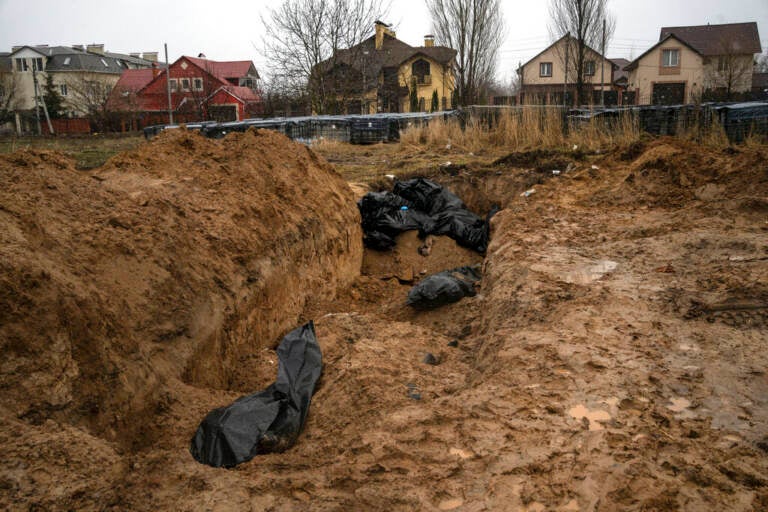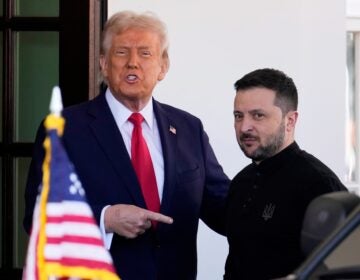Images from Ukraine and the case for war crimes
As evidence mounts of war crimes in Ukraine, we look at the role of photojournalism in documenting the war and how to hold Putin accountable for the atrocities.
Listen 49:00
Bodies lie in a mass grave in Bucha, on the outskirts of Kyiv, Ukraine, Sunday, April 3, 2022. Ukrainian troops are finding brutalized bodies and widespread destruction in the suburbs of Kyiv, sparking new calls for a war crimes investigation and sanctions against Russia. (AP Photo/Rodrigo Abd)
More horrific photographs and footage are emerging from Ukraine, including many images from the town of Bucha after the recent Russian withdrawal. Ukraine authorities say the bodies of 400 civilians have been found, some in mass graves, others killed on streets and in backyards, many with their hands bound behind their backs. Evidence of Russian war crimes like the killing and torture of the Ukrainian people is mounting. President Biden called Putin a “war criminal” and said these atrocities should be prosecuted. But Russia has denied the allegations, even suggesting that the images coming out of Ukraine are “staged performances.”
This hour, we discuss the role of graphic photos and videos in documenting the reality of the war and alleged war crimes. And we look at how to hold Putin and other leaders accountable for this depravity? We talk with a former war crimes prosecutor who tried former Liberian President Charles Taylor, about what constitutes a war crime, how to build a case, and how to hold a leader criminally responsible
Guests
Lynsey Addario, Photojournalist who has been covering the war in Ukraine for the New York Times. She’s the author of It’s What I Do and Of Love and War. @lynseyaddario
Barbie Zelizer, Raymond Williams Professor of Communication and Director of the Center for Media at Risk at the University of Pennsylvania’s Annenberg School for Communication. @bzelizer
David Crane, Founding Chief Prosecutor for UN Special Court for Sierra Leone (which tried former Liberian President Charles Taylor) and a Distinguished Scholar in Residence, Syracuse University College of Law; and the Founder of Global Accountability Network.
Read more
The New York Times, Photographing the Reality of War -“I often focus on civilians and women and children because for me, those are the victims of war because they’re not participating in the fight, they’re just the innocent victims…”
NBC News, Horrifying images from Ukraine spark renewed calls for war crime investigations -Ukrainian officials have compared the scenes in Bucha and nearby towns to historic atrocities committed during World War II and in Bosnia in the 1990s.
PBS/AP, How Would Those Accused of Ukraine War Crimes Be Prosecuted? – “The bottom line is this is medieval warfare in the Ukraine. It’s precisely the sort of warfare that the laws of armed conflict were designed to prevent,” said David Crane, a veteran of numerous international war crime investigations.
WHYY is your source for fact-based, in-depth journalism and information. As a nonprofit organization, we rely on financial support from readers like you. Please give today.





